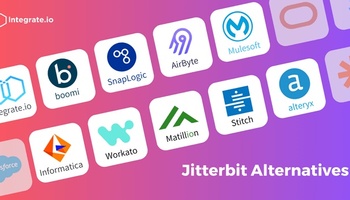Mulesoft is an all-inclusive data and application integration platform owned by Salesforce. It offers many types of functionality, including Extract, Transform, Load (ETL), API management, and Integration Platform as a Service (IPaaS). Mulesoft may offer a broad range of capabilities, but it has a challenging learning curve, a high price point, and may be far more than what your organization needs for data transformation. We searched through all the ETL solutions on the market and found that these are the top five Mulesoft alternatives.
1. Integrate.io
Integrate.io is a secure, cloud-based ETL platform that makes data transformations easy and approachable even for non-technical users. The low-code, drag-and-drop interface minimizes the learning curve for setting up workflows, and there is an X-console feature for advanced functionality and more complex pipelines.
Another way this platform is a great Mulesoft alternative is through the 200+ built-in connectors and REST API connector that works with the rest of your data sources. You can connect to popular SaaS platforms, databases, data warehouses, and more. Integrate.io also excels at data security and compliance, allowing organizations across many industries to use it for their workloads. This platform complies with SOC 2, GDPR, HIPAA, and CCPA. These enterprise-grade capabilities are wrapped up in a cost-effective platform that easily fits into small, medium-size business budgets. Integrate.io pricing is tailored exactly to each client's needs and requirements with a usage-based component couple with features and functionality. Clients choose which level of platform usage they will require and then which features and functionality to create a custom plan to fit their use case.
2. AWS Glue
AWS Glue revolves around building data warehouses and powering analytic solutions. It has a serverless configuration and automates many data pipeline operations such as scaling, error handling, adjusting database schemas, and discovering metadata. You can also set up ETL jobs to launch automatically based on a particular schedule, event, or defined trigger. This platform works best with other AWS services, thanks to its tight integration. AWS Glue requires advanced technical knowledge to set up ETL scripts to apply data transformations, and its functionality is fairly limited in scope compared to other Mulesoft alternatives.
3. Informatica
Informatica is a comprehensive cloud data management platform, similar to Mulesoft’s all-in-one functionality. This enterprise-grade solution supports highly complex integration use cases and many other data management and governance operations. Informatica does a good job supporting heavy data integration and management workloads across large organizations, providing a single ecosystem of services for this purpose.
However, much like Mulesoft, Informatica is incredibly complex to use and has a high price tag. Data engineers must create the data pipelines, and the training and certification process is extensive. It will take a significant time and resource investment to get the most out of this platform, and you may not end up using half of the features.
4. Jitterbit
Jitterbit is another all-in-one data integration platform featuring ETL, API management, and iPaaS capabilities. It offers both on-premises and cloud-based deployment options, although it is not a cloud-native environment. You do have access to no-code and low-code ETL pipeline builders in Jitterbit, making it more user-friendly than Mulesoft. However, these features only support simple pipelines, so you’ll need a data engineer for more complex use cases. You would also pay extra for access to an all-in-one solution, when a dedicated ETL tool may be better suited to your requirements.
5. Alteryx
Alteryx is an analytics platform that happens to include ETL functionality to support its core capabilities. The ETL tool simplifies the delivery of analytics-ready data to support business intelligence tools of all types.
While it has no-code and low-code interfaces, the solution is built around data and business analyst users. Users outside of this core group may struggle with creating data pipelines. You have the flexibility of setting up an on-premises or cloud-based Alteryx deployment, although this is not a cloud-native platform. However, you must manage the underlying infrastructure and the associated costs. Another drawback of this solution is that it has limited built-in SaaS connectors. If you want to combine your data analytics and ETL operations into a single platform, Alteryx is a compelling Mulesoft alternative, but it’s more limited outside of this use case.
Comparison of Key Data Integration Platforms
Here’s a comparison table for alternatives to MuleSoft, detailing each tool's key features, security credentials, target audience, and pricing model.
| Tool | Key Features | Data Security Certifications | Target Users | Pricing Model |
|---|---|---|---|---|
| Integrate.io | True low-code ETL, ELT, Reverse ETL, 200+ connectors, field-level encryption, real-time data transformations | SOC 2, GDPR, HIPAA-compliant, AES-256 encryption via AWS KMS | Businesses requiring secure, scalable data integration | Subscription-based, flexible plans |
| AWS Glue | Serverless ETL, auto-scaling, Apache Spark-based, integrates with AWS ecosystem | SOC 2, GDPR-ready, HIPAA-compliant in specific AWS regions | Organizations already within AWS infrastructure | Pay-as-you-go, based on usage |
| Informatica | Advanced ETL, data governance, data quality, cloud data integration, AI-driven automation | SOC 2, GDPR, HIPAA, ISO 27001 | Enterprises needing end-to-end data management | Subscription-based, enterprise-focused |
| Jitterbit | API integration, ETL, low-code API creation, pre-built connectors for SaaS and ERP systems | SOC 2, GDPR-ready | Medium to large businesses with API and integration needs | Subscription-based, tiered pricing |
| Alteryx | Data prep, analytics, ETL, and machine learning, geared toward business analysts | SOC 2, GDPR-ready, HIPAA-compliant in specific versions | Data-focused teams and business analysts | Subscription-based, flexible plans |
Details on Choosing the Best MuleSoft Alternative
-
Platform Compatibility and Ecosystem
- Choose AWS Glue if you are deeply integrated within the AWS ecosystem and need seamless connectivity with AWS services.
- Select Informatica if you require a platform-agnostic approach to integrate with various on-premises and cloud systems. Informatica also offers a robust set of governance tools, making it ideal for complex enterprise data ecosystems.
- Go with Integrate.io or Jitterbit if you need flexibility with SaaS applications, databases, and APIs. Integrate.io’s REST API connector and Integrate.io's API integration focus are useful for connecting with unique or niche systems.
-
Ease of Use and No-Code/Low-Code Capabilities
- Choose Integrate.io or Jitterbit if your team requires low-code or no-code tools for building data pipelines and API integrations. Both platforms offer intuitive interfaces that support rapid deployment and minimal coding.
-
Cost and Pricing Flexibility
- Select AWS Glue for a pay-as-you-go model that scales with usage, ideal for companies needing cost-effective solutions with fluctuating ETL workloads.
- Consider Integrate.io if you need predictable subscription-based pricing with options to scale as needed. Integrate.io offers flexible plans, while Jitterbit’s tiered pricing can support growing API and integration needs.
- Choose Alteryx for predictable, user-based pricing if you primarily need data prep and analytics alongside ETL and do not require extensive API integrations.
-
API Integration and Connectivity Needs
- Opt for Jitterbit if your focus is on robust API integration, especially if you need to create and manage APIs with minimal code.
- Choose Integrate.io if you need a broad array of connectors with flexibility for data integration and transformation across multiple data sources, including support for API-based connections.
Explore Integrate.io as a Mulesoft Alternative
Are you looking for a best-in-class, secure ETL platform that doesn’t overcomplicate things? Out of these five Mulesoft alternatives, Integrate.io offers the right combination of user-friendliness, affordability, and functionality for data workflows of all shapes and sizes. Get hands-on with a 7-day Integrate.io demo that shows you the power of a cloud-native, user-friendly data pipeline platform.
Frequently Asked Questions
Q: What are MuleSoft Open-Source Alternatives?
1. Apache Camel– A flexible, lightweight integration framework with extensive connectors, Apache Camel enables routing and mediation through a domain-specific language, ideal for code-driven integration projects.
2. WSO2 Enterprise Integrator – This robust, open-source tool offers API management, data transformation, and process orchestration, making it suitable for cloud and on-premise environments.
3. Apache Nifi – Designed for real-time data flow automation, Nifi provides a graphical interface for managing and monitoring data flows, ideal for organizations seeking minimal coding.
4. Talend Open Studio – An open-source ETL tool with an intuitive interface and robust connectors, Talend is well-suited for small to mid-sized businesses with diverse data sources.
5. Kong API Gateway – A lightweight, open-source API gateway with plugins for rate limiting and authentication, Kong works well for scalable API management and service mesh needs.
Q: What are MuleSoft Anypoint Alternatives?
1. Integrate.io – A low-code cloud-native platform offering ETL, ELT, and reverse ETL capabilities, Integrate.io supports both cloud and on-premise data integration with extensive connectors.
2. Boomi – A cloud-native iPaaS with API management and automation, Boomi provides a drag-and-drop interface ideal for enterprises needing versatile cloud integration.
3. WSO2 API Manager – An open-source API management platform with design, publishing, and analytics tools, WSO2 is a scalable solution with built-in analytics for large organizations.
4. Workato– A user-friendly iPaaS with pre-built connectors and automation workflows, Workato is well-suited for business users requiring easy integrations.
5. Talend Cloud– Offering unified data integration, API management, and data quality, Talend Cloud is a powerful solution for mid-size to large organizations.
6. Apigee – An advanced API management platform from Google Cloud, Apigee supports security, analytics, and hybrid deployment, ideal for enterprises with complex API requirements.










